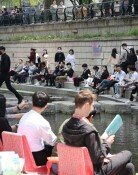Korea Hires Congressional Lobbyists
Korea Hires Congressional Lobbyists
Posted December. 12, 2005 08:20,
On December 9, Korean Ambassador to the United States Lee Tae-sik sent a letter to the Budget and Account Committee of the National Assembly, Seoul. In his letter, Ambassador Lee called for a smooth allocation of the one-billion-won budget that the Embassy requested for lobbying the U.S. Congress next year. We will focus on correcting our procurement system of U.S. weapons, which cost us more than Japan. We will also work on creating a favorable atmosphere for Koreas joining of the Visa Waiver Pilot Program (VWPP) and concluding a free trade agreement (FTA) with the United States, said Lee, clarifying the specific goals of the lobbying.
The letter from Ambassador Lee seems to be a record of resolutions implying that it is high time for Korea to open a new chapter in lobbying Washington in an open and legitimate manner. The Korean Embassy to the U.S. entered into a three-month pilot contract with a Washington-based lobbying agency Scribe Strategies and Advisors (SSA) from October through December to gauge the possibility of lobbying diplomacy. According to a copy of the contract that Dong-A Ilbo obtained, the monthly payment to SSA is 10,000 dollars, which is tantamount to the actual expenses for a lobbying service.
The contract is considered Koreas first legitimate lobbying campaign, for which the SSA will officially report to the U.S. Department of Justice (DOJ) as representatives of the Korean government. This means the Korean government has finally taken its first step onto K Street, the home of lobbying agencies in Washington. The contract has generated mixed judgments, but there are already some signs of tangible results from the contract. In August, Rep. Dan Burton (R-Ind.) circulated in the U.S. Congress a Dear Colleague Letter emphasizing the significance of the Korea-U.S. alliance. In November, Sen. Joseph Biden (D-Del.) suggested the U.S. needed to provide a visa waiver for Korea.
There are also many critics, however, who question the necessity and effectiveness of lobbying Washington. Lobbying never solves all the problems, especially when the Participatory Government has already hurt Korea-U.S. relations, said research professor Kim Chang-joon of Korea University, the first Korean member of the U.S. House of Representatives. One lobbyist also played down the outcome of the lobbying, adding, and Nobody reads a Dear Colleague letter.
Seung-Ryun Kim srkim@donga.com







